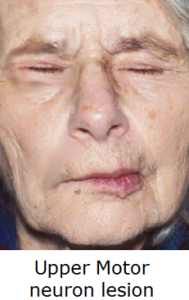

MedFriendly®


Upper Motor Neuron Paralysis
Upper motor neuron paralysis is a type of paralysis (loss of
movement and/or sensation) that is due to injury or damage in the
brain or spinal cord. This injury or damage in the brain or spinal
cord causes damage to the cell body (the main part of the cell)
and/or axons (the part of a nerve that sends a message) of the
upper motor neurons. Upper motor neurons are neurons (nerve
cells) in the motor cortex (an area of the brain located in middle,
top part of the brain) that form pathways within the brain and from
the brain to the spine.
FEATURED BOOK: Upper Motor Neuron Syndrome & Spasticity
In upper motor neuron paralysis, muscles are only affected in groups. Weakness occurs
and so does paralysis, which is how this disorder got its name. Slight wasting away of
muscles, tissues, and organs can occur from not using them, but sometimes no wasting
away occurs at all. Another problem associated with upper motor neuron paralysis
includes spasticity (involuntary muscle contractions) with hyperactive deep tendon
reflexes (contracting muscles in response to a stretched muscle caused by a sharp tap).
Spasticity is a condition in which there is increased tension in muscles that resist the
force of gravity (the natural force that pulls objects downwards) as well as increased
resistance to stretch. Abnormal reflexes are present in upper motor neuron paralysis such
as the Babinski reflex (when the big toe moves back and the other toes fan out after
stroking the bottom of the foot) and Hoffman's reflex. Hoffman's reflex is when the end of
the thumb and part of one or more of the other fingers flex in response to a sudden hard
flick of the index, middle, or ring finger.
"Where Medical Information is Easy to Understand"™
Superficial reflexes (reflexes caused by stimulating the skin and not
deeper areas) are absent. No muscle twitching occurs in upper
motor neuron paralysis. Upper motor neuron paralysis can be
compared to lower motor neuron paralysis, a type of disorder that
causes loss of movement and sensation due to injury or damage to
A lower motor neuron is the part of a motor neuron (a type of nerve
cell) that connects to the skeletal muscles. Skeletal muscles are
muscles that are connected at either or both arms or legs with the
skeleton of the body.















